Technology
Genetics technology could lead to more crops, fresher food

File Photo: “We think this is a transformative technology — it’s very powerful.” (Photo by CAFNR/Flickr, CC BY-NC 2.0)
BOISE, Idaho — A multinational agricultural company based in Idaho has acquired gene editing licensing rights that could one day be used to help farmers produce more crops and make grocery store offerings such as strawberries, potatoes and avocados stay fresher longer.
J.R. Simplot Company on Monday announced the agreement with DowDuPont Inc. and the Broad Institute of the Massachusetts Institute of Technology and Harvard University, developers of the nascent gene editing technology. Simplot is the first agricultural company to receive such a license.
“We think this is a transformative technology — it’s very powerful,” said Issi Rozen, chief business officer of the Broad Institute. “We’re delighted that Simplot is the first one to take advantage of the licensing.”
There is no evidence that genetically modified organisms, known as GMOs, are unsafe to eat, but changing the genetic code of foods presents an ethical issue for some. For example McDonald’s had declined to use Simplot’s genetically engineered potatoes for its French fries.
The food industry has also faced pressure from retailers as consumer awareness of genetically modified foods has increased.
J.R. Simplot officials declined to say how much the company paid for the licensing rights acquired through a process intended to prevent the technology from being used unethically. The technology allows scientists to make precise changes to the genome of living organisms and has wide-ranging applications for improving plant food production and quality.
“The issues are about getting the right kind of food produced in the right kind of way,” said Neal Gutterson, chief technology officer at Corteva Agriscience, DowDuPont’s agriculture division. “It’s important to be able to produce enough food for the nine to 10 billion people who will be on the planet in 30 years.”
The gene editing technology is called CRISPR-Cas9, the first part an acronym for “clustered regularly interspaced short palindromic repeats.” The technology speeds up the traditional process of breeding generation after generation of plants to get a certain desirable trait, saving years in developing new varieties that are as safe as traditionally developed varieties, scientists say.
Essentially, if an organism’s genome is made analogous to a large manuscript, CRISPR-Cas9 allows scientists to edit specific words in the manuscript using a “search and replace” function. One of the remaining challenges, scientists say, is getting the complete genome for particular food crops. Or, to use the analogy, to not only have the complete manuscript but to have it translated so scientists know where to make the edits.
The CRISPR-Cas9 technology is so new that in March the U.S. Department of Agriculture, which regulates how food is produced, issued a statement clarifying its oversight of foods produced with gene editing. “Under its biotechnology regulations, USDA does not regulate or have any plans to regulate plants that could otherwise have been developed through traditional breeding techniques,” the agency said.
Simplot markets products in more than 40 countries, and ithas major operations in the United States, China, Canada, Australia and Mexico. The company, which is a top producer of avocados grown in Mexico and sold in the U.S., is perhaps best known for potatoes.
The company has already used other genetic techniques to adapt genes from wild and cultivated potatoes to produce commercially sold potatoes that resist bruising and late blight, which caused the Irish Potato Famine and continues to cause problems for potato farmers. Gene editing is expected to further the company’s expertise in potatoes.
“That’s part of our vision for Simplot — to be the knowledge leader for potatoes,” said Susan Collinge, vice-president of plant sciences at Simplot, where she supervises about 95 plant scientists.
Idaho produces 13 billion pounds (6 billion kilograms) of potatoes annually — a third of the nation’s potatoes — worth about $1.2 billion.
Gene editing likely wouldn’t result in new varieties of potatoes for at least five years, and probably longer before the potatoes could be sold commercially, Collinge said.





















